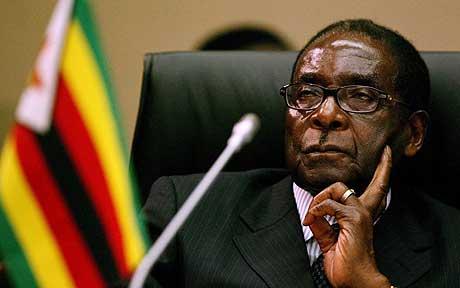Polls open in Zimbabwe elections
 0 Comment(s)
0 Comment(s) Print
Print E-mail Xinhua, July 31, 2013
E-mail Xinhua, July 31, 2013
Zimbabweans went to the polls on Wednesday to choose a winner between the southern African country' s two long-time political rivals -- President Robert Mugabe and Prime Minister Morgan Tsvangirai.
|
|
|
Robert Mugabe [Agencies] |
The presidential poll showdown between the two is the third time in a decade. Mugabe, Africa's oldest head of state at the age of 89, won the previous two elections which were disputed by his rivals.
Both leaders are hopeful that they will romp to victory in Wednesday's elections and are basing their confidence on the huge numbers that attended their campaign rallies.
Asked at a press conference Tuesday what his chances of victory were, Mugabe said, "As good as the chances we had in 1980."
Asked the same question at a previous interview, Tsvangirai said, "I am very bullish about the outcome of this election. It will indicate to you the resilience of the people."
Some 6.4 million voters are also expected to vote for more than 200 members of parliament and 1,958 of local councillors.
Eager to vote, some people lined up before the polling station as early as Wednesday mid-night. Early bird voters used quilts and thermos as they roughed out the chilly Harare winter night outside the polling stations.
Angelica Mumba, 65, said she will vote for Mugabe's Zanu-PF party because it is the only party with a vision for Zimbabwe.
"Zanu-PF has the future of the country. I want it to come back to power and rebuild the nation," Mumba said.
Disputes and violence marred Zimbabwe's last elections in 2008. Mugabe, who won a disputed second round of presidential race, was forced into a coalition government with Tsvangirai, who won the first round.
The coalition government, though shored up a near collapse economy, dragged on four years amid continuous bickering among its major political parties.
Liu Guijin, head of the five-man Chinese observers' team, described the vote as a potential "milestone" in Zimbabwe's post- independence history.
"If credible, it can end the transitional coalition government and poise the country towards new political and social developments," Liu told reporters "We believe Zimbabwe has every condition to be much better-off than what it is today".
But this year's electoral process began with a chaotic start. An early voting arranged for police and polling officers was marred by delays in the delivery of ballot paper. About half of the more than 60,000 people who were supposed to vote on July 14 and July 15 failed to cast their votes.
Police officers who were denied the right to vote were given priority on Wednesday when the polls started at 7:00 a.m. (0500 GMT) nationwide.
At a polling station inside Alexandra Park Primary School in Harare's north suburb, hundred of policemen queued from 5 a.m. to vote.
"The process goes on smoothly. I will soon go on duty," said a police woman who declined to be named.
Tsvangirai, who cried foul of the chaotic electoral process, has openly questioned the Zimbabwe Electoral Commission's ability to conduct orderly votes.
His party also raised concern Tuesday over the failure by authorities to avail them copies of the electronic voters'roll for inspection.
Finance Minister Tendai Biti, the third-ranking official in Tsvangirai's MDC-T, said it would be difficult for Zimbabwe to have free, fair and credible elections in light of these discrepancies.
Mugabe, in the rare group interview with foreign press on Tuesday, acknowledged "the hitches here and there" but denied that he systematically engineered these to rig the elections.
"I don't have the power to manipulate the elections. I don't control the electoral process. I simply comply and obey the electoral law," he said.
Mugabe is a key figure in Zimbabwe's struggle for independence in the 1960s and 1970s. He was elected prime minister in 1980 and the country's first executive president in 1987.
Since then, Mugabe won presidential elections in 1990, 1996, 2002, and 2008. He has served one year less than Angola's Eduardo dos Santos and Equatorial Guinea's Teodoro Obiang Nguema, both of whom have been in office for the past 34 years.
The country's new constitution, which was passed this year, stipulates that a president can only serve two five-year terms but it is not retroactive, meaning in theory Mugabe can rule until 2023.
Asked whether it is his last election on Tuesday, Mugabe jokingly answered "why do you want to know my secrets?"
John Campbell, U.S.-based Ralph Bunche Senior Fellow for Africa Policy Studies, said so long as Mugabe lives, ZANU-PF will likely win a national election. It benefits from the advantage of incumbency.
Land is by far the most important domestic issue in the country and Mugabe has been on the side of justice from the point of view of black Zimbabweans, Campbell said in an analysis posted on the website of U.S. Council on Foreign Relations.
According to the Zimbabwe Electoral Commission, a vote count will immediately commence after polls close. Results for the final presidential vote will be announced within five days. If no candidate wins 50 percent plus one vote, which is required for an outright win, a run-off will be held on Sept. 11.







Go to Forum >>0 Comment(s)